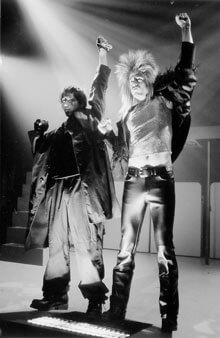The Blue Heron Arts Group satirizes rock stars, America’s best-paid heroes
There was a time when Off-Off Broadway was a hotbed of politically motivated, risk-taking theatrics. From the 1960s forward, small theater companies were dedicated to challenging the established theatrical structures and delivering social criticism spiced with a healthy dose of irony and satire. Celebrated playwrights such as Terrence McNally and Israel Horowitz got their start in the Off-Off Broadway movement and defined for a generation the power and potential of theater outside the mainstream.
Sadly, economics and shifting tastes have rendered Off-Off-Broadway much less volatile than it was in its heyday, and the chances of finding something truly and startling original in the tucked away theaters and spaces is more difficult than it has ever been.
All of which is why it’s a delight to see the Gorilla Theater’s new production of “Corporate Rock.” It is a twisted, acerbic, and stinging indictment—and not just focused on the contemporary recording industry. It would be too easy merely to satirize that pabulum-infused, market-researched music that passes for rock today. Instead, playwright William Bennett has gone after what in his opinion (and it’s hard to disagree) is an even more abstract and important target—Rolling Stone magazine, that arbiter of taste for the generation of consumers who don’t want to make up their own minds but who want to be told what’s cool.
The story concerns fledgling writer Dylan Miller who refuses to play the game required at the magazine and dares to express his own opinions, writing what is altogether appropriate commentary about the music he hears around him. He is a man who would rather be shot by a would-be rocker from the French mafia than admit that Kiss was the best band ever—and he very nearly experiences death in exactly this fashion. The plot includes a bizarre kidnapping, torture with heavy metal music, slimy editors, ambitiously political assistant editors, and a faked trip to South America. When celebrity writer Nathaniel Hunger disappears, Dylan thinks it’s his chance, and this is the closest he ever comes to selling out just to get ahead. But in the end, his close calls with death and the experience of having his mother throw him out on his own now that he’s 30 convince him of the need to live a life in which he doesn’t hide his passions and beliefs.
The play has a logic all its own and is rife with absurd situations and characters, but ultimately delivers a very moving story about how our souls can be compromised by the marketplace. Still, Bennett has a light touch, and the play is also very funny.
Director Timothy Haskell has embraced the absurdity—and the serious message underneath it—with the same kind of twisted gusto that he brought to his “fight-sical” “Road House” last year. Haskell is unafraid to be silly or extreme, and the fast-paced action is a study in precision pandemonium. What might seem self-indulgent and facile coming from a less competent director comes off as pointedly hilarious, and one is constantly aware that intelligence underpins the play’s extremes.
The cast is more than up to the challenge. Travis York plays Dylan with a kind of crazed intensity that is always charming. Jamie Benge gives Nathaniel an over-the-top portrayal of a vacuous celebrity. Other key roles include Chan, a writer who’s doing what he needs to do to get along, played with understated melancholy by Charles Jang. Aaron Haskell plays two roles, most notably a would-be white rapper who is all but unintelligible. Haskell is a deft comic actor who has the patois and the moves down and yet plays the role as blind to his absurdity. Nick Arens is bizarrely appropriate as the criminal/rocker Jean Francois and plays the lunacy of the scenes completely straight, which adds to the fun—and the bite of the piece. The rest of the cast—Natalia Hernandez, Dorian Missick, Gerry Diamond, and Kellie Arens are similarly committed to the piece and unafraid to go with the insanity.
Do not expect a placid linear narrative from “Corporate Rock.” The charm of this piece is in the excesses and absurdities, which in themselves are a commentary on more popular or normative story telling and acting styles. The play is a welcome tweaking of popular culture in all its guises—and it’s refreshingly exciting to see that people are still willing to be creative and entertaining in their social criticism. Would that more people had the courage of the Gorilla Theatre’s convictions.




































